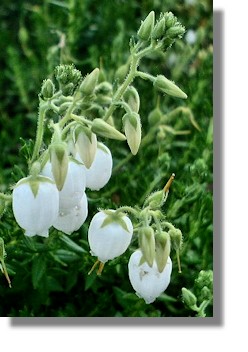

Gaelic and Celtic Customs
from the Hebrides and Beyond
Fada's Farsaing (Far and Wide) is a series of articles by Liam O Caiside in English but with Gaelic words and phrases interwoven in the text. The articles describe a wide range of Gaelic and Celtic customs. These pages were originally published in the "Scottish Radiance" e-magazine and have been reproduced here with the kind permission of the Scottish Radiance editor, Sharma Krauskopf.
Legend of Lucky White Heather

White Bell HeatherOssian is the narrator and purported author of a cycle of epic poems published by the Scottish poet James Macpherson from 1760. Macpherson claimed to have collected word-of-mouth material in Scots Gaelic, said to be from ancient sources, and that the work was his translation of that material. Ossian is based on Oisín, son of Finn or Fionn mac Cumhaill, anglicised to Finn McCool, a legendary bard who is a character in Irish mythology. Contemporary critics were divided in their view of the work's authenticity, but the consensus since is that Macpherson framed the poems himself, based on old folk tales he had collected, and that "Ossian" is, in the words of Thomas Curley, "the most successful literary falsehood in modern history." But Macpherson's fame was crowned by his burial among the literary giants in Westminster Abbey, and W.P. Ker, in the Cambridge History of English Literature, observes that "all Macpherson's craft as a philological imposter would have been nothing without his literary skill. The graphic on the right (via Wikimedia) is a painting of Ossian and some the characters he portrayed.
Here is his tale about why white heather is considered lucky:
The Celtic bard Ossian had a beautiful daughter, Malvina, who was as good as she was lovely. (Graphic on the left is a painting by Johann Peter Krafft, 1780–1856 via Wikimedia) She was betrothed to Oscar, bravest of all the warriors.
One fine autumn day, as Malvina listened to her father's music and thought of her beloved Oscar's imminent return from a war-like expedition, she saw a figure limping towards them over the heather clad moor. It was Oscar's faithful messenger, who, wounded and weary, knelt before her, gave her a spring of purple heather and told her that Oscar was slain in battle. As he lay dying, Oscar had plucked the heather and asked that it be given to Malvina as a token of his eternal love.
As she listened, tears fell from Malvina's eyes onto the purple heather. It immediately became white!Thereafter, as father and daughter walked over the moors, Malvina's tears fell upon patches of purple heather turning them white.
Even in the depths of her sadness wishing that other might be happier than she, Malvina prayed thus, "May the White Heather, symbol of my sorrow, bring good fortune to all who find it."
Return to Fada's Farsaig Index
Where else would you like to go in Scotland?

